Unit 3 Could you please tell me where the restrooms are?Section A 语法课件:Object Clauses 30张
文档属性
| 名称 | Unit 3 Could you please tell me where the restrooms are?Section A 语法课件:Object Clauses 30张 | 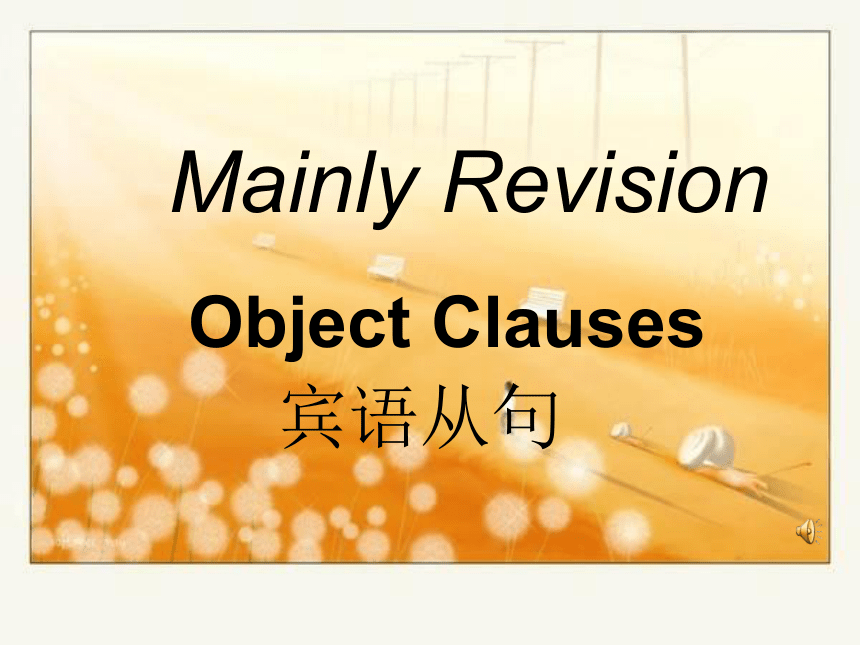 | |
| 格式 | ppt | ||
| 文件大小 | 2.8MB | ||
| 资源类型 | 教案 | ||
| 版本资源 | 人教新目标(Go for it)版 | ||
| 科目 | 英语 | ||
| 更新时间 | 2021-02-21 16:40:12 | ||
图片预览

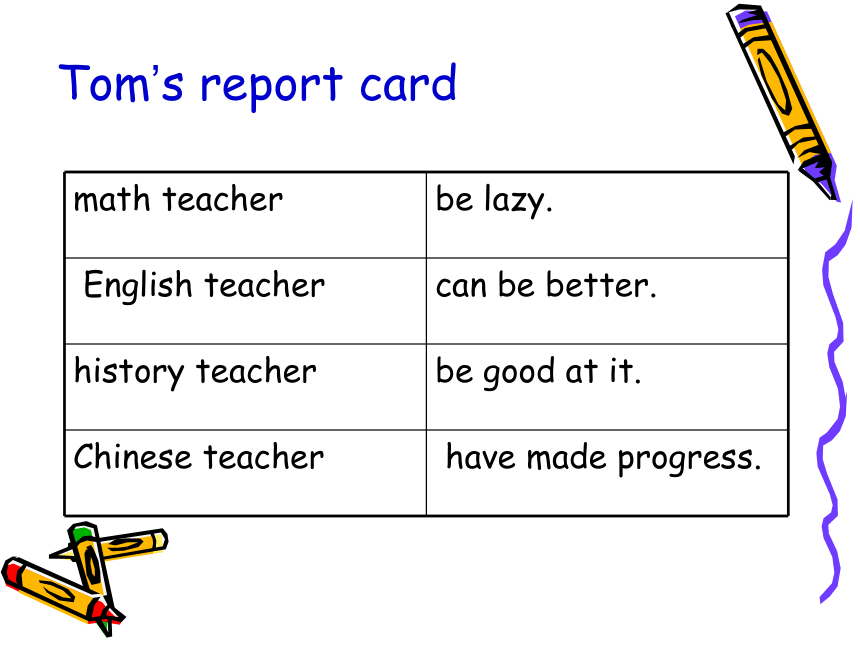
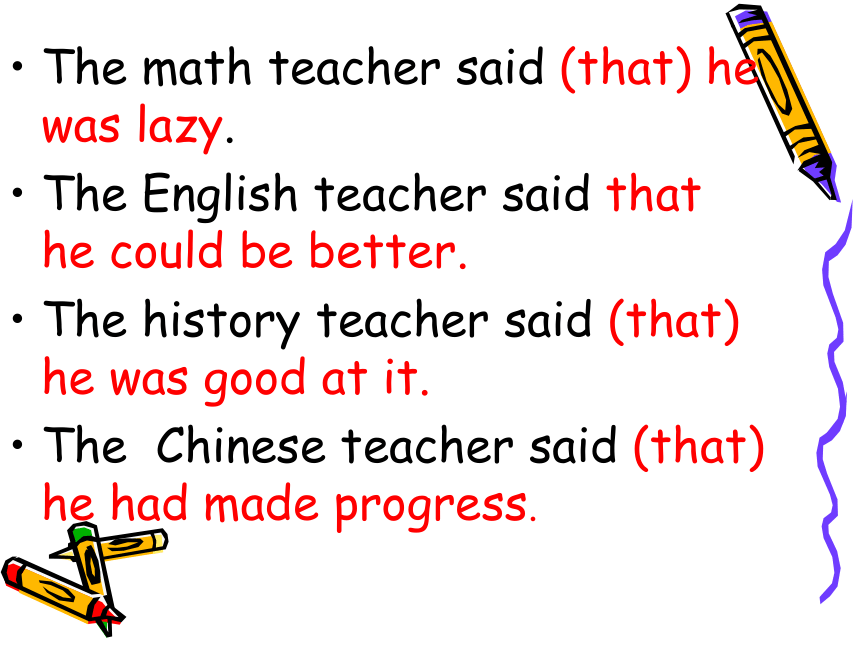
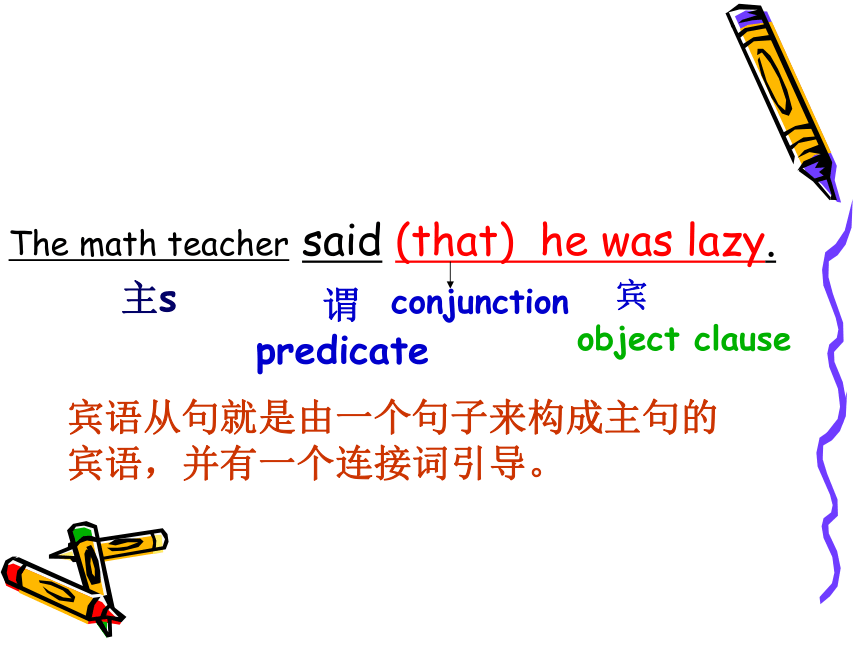
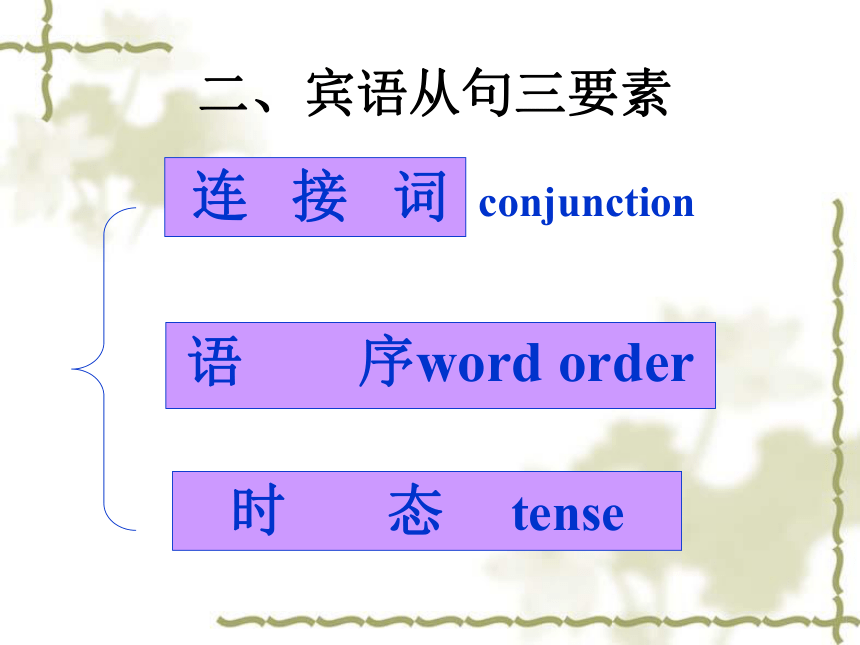
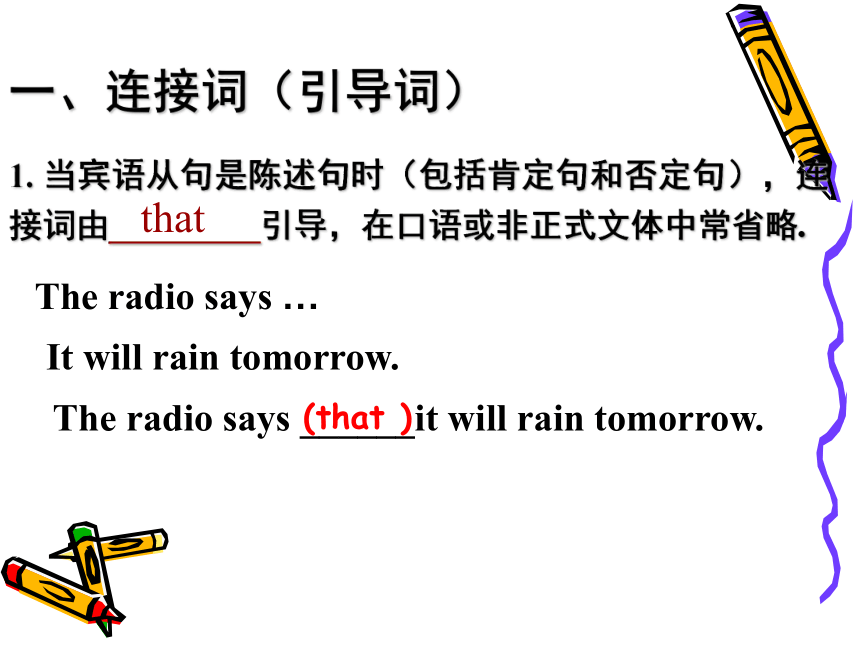
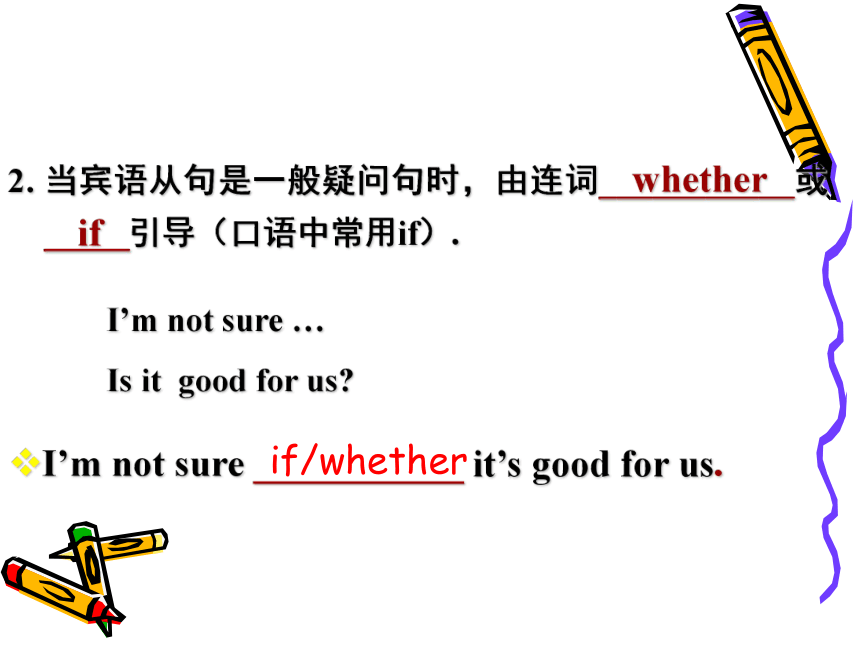
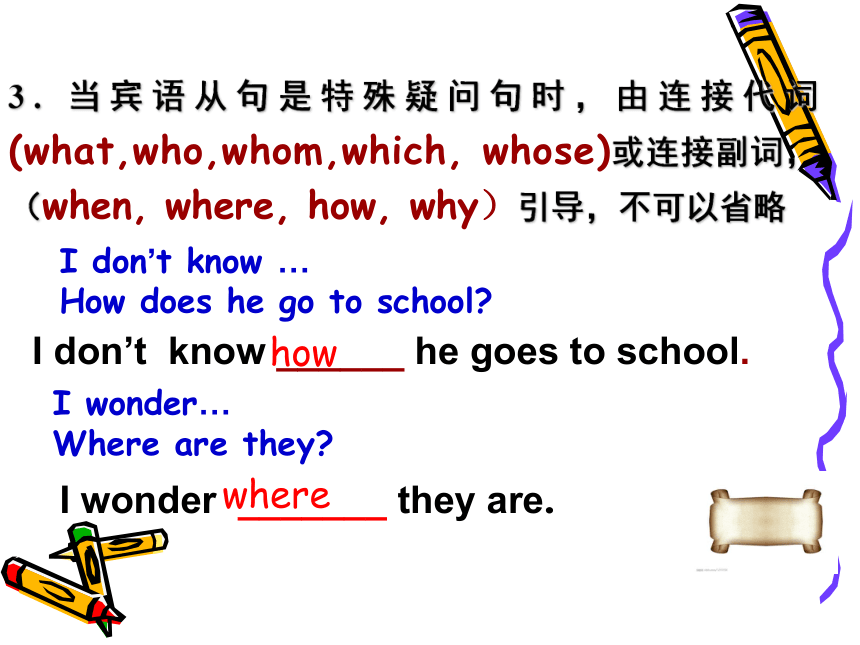
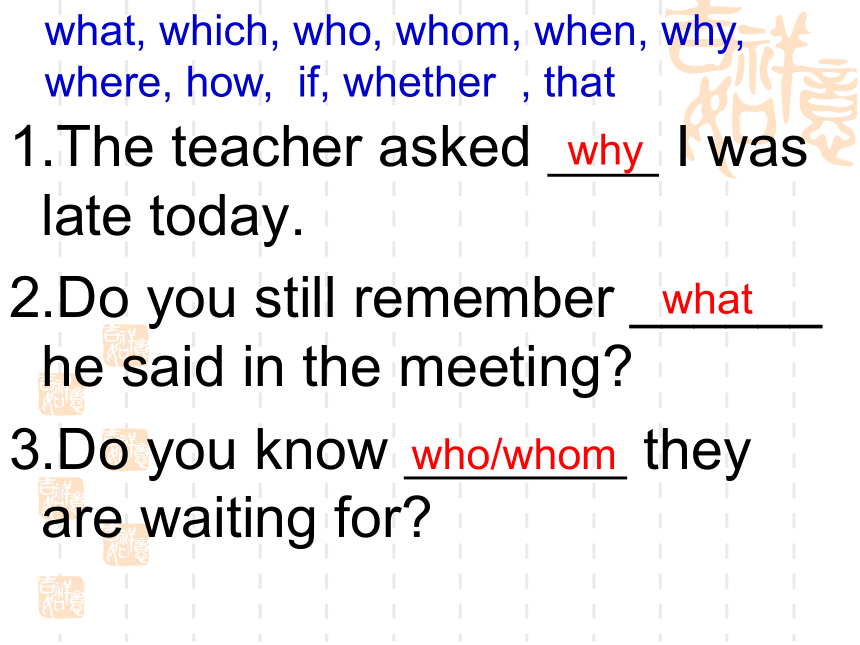
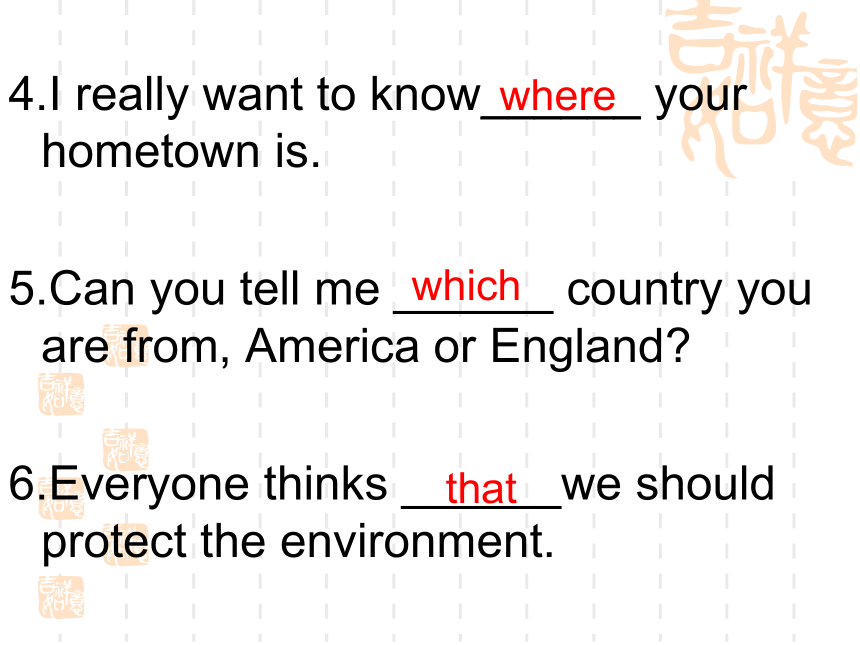
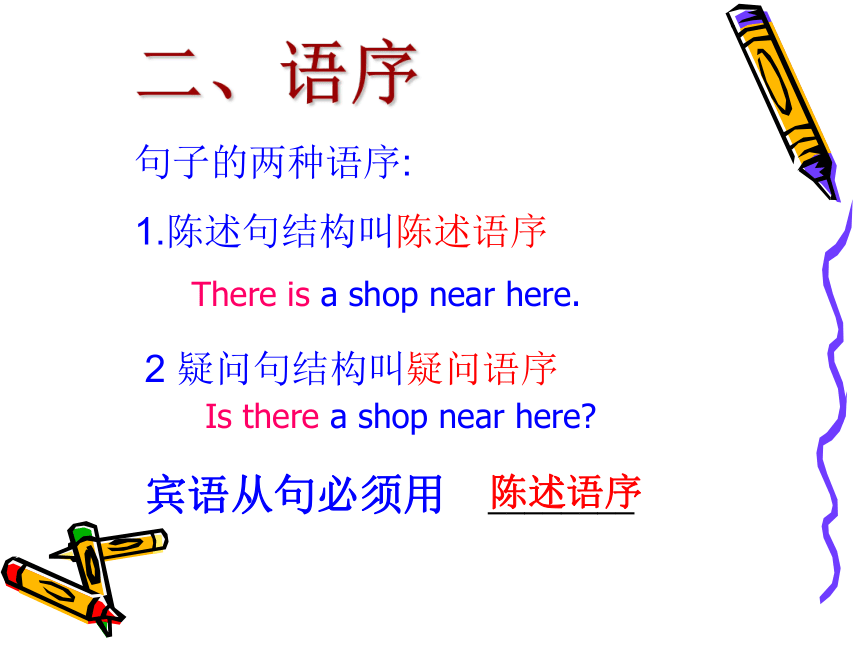
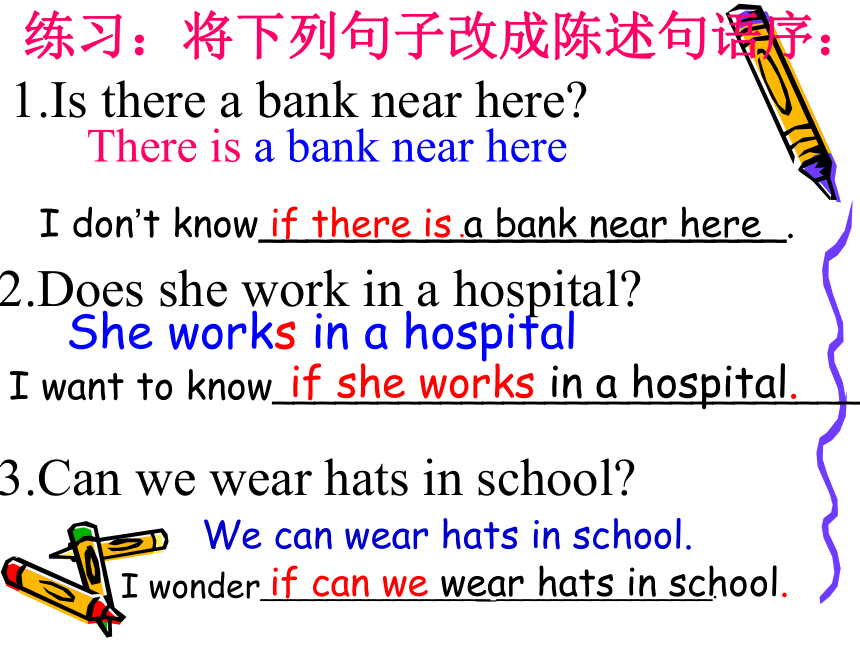
文档简介
Mainly Revision
Object Clauses
宾语从句
Tom’s report card
math teacher
be lazy.
English teacher
can be better.
history teacher
be good at it.
Chinese teacher
have made progress.
The math teacher said (that) he was lazy.
The English teacher said that he could be better.
The history teacher said (that) he was good at it.
The Chinese teacher said (that) he had made progress.
object clause
The math teacher said (that) he was lazy.
主s
谓
predicate
conjunction
宾
宾语从句就是由一个句子来构成主句的宾语,并有一个连接词引导。
二、宾语从句三要素
连 接 词 conjunction
时 态 tense
语 序word order
1. 当宾语从句是陈述句时(包括肯定句和否定句),连接词由_________引导,在口语或非正式文体中常省略.
The radio says …
It will rain tomorrow.
that
The radio says ______it will rain tomorrow.
一、连接词(引导词)
(that )
2. 当宾语从句是一般疑问句时,由连词___________或_____引导(口语中常用if).
I’m not sure ___________ it’s good for us.
whether
if
I’m not sure …
Is it good for us?
if/whether
3. 当宾语从句是特殊疑问句时,由连接代词(what,who,whom,which, whose)或连接副词,(when, where, how, why)引导,不可以省略
I don’t know ______ he goes to school.
I wonder _______ they are.
how
where
I don’t know …
How does he go to school?
I wonder…
Where are they?
1.The teacher asked I was late today.
2.Do you still remember ______ he said in the meeting?
3.Do you know they are waiting for?
what, which, who, whom, when, why, where, how, if, whether , that
why
what
who/whom
4.I really want to know______ your hometown is.
5.Can you tell me ______ country you are from, America or England?
6.Everyone thinks ______we should protect the environment.
where
which
that
二、语序
句子的两种语序:
1.陈述句结构叫陈述语序
2 疑问句结构叫疑问语序
宾语从句必须用 ________
陈述语序
There is a shop near here.
Is there a shop near here?
练习:将下列句子改成陈述句语序:
1.Is there a bank near here?
2.Does she work in a hospital?
3.Can we wear hats in school?
There is a bank near here
She works in a hospital
I wonder_________________ ________________.
I don’t know______________________.
if she works in a hospital.
if there is a bank near here
I want to know____________________________.
if can we wear hats in school.
We can wear hats in school.
三.宾语从句中时态的变化
I hear (that)
Jim ( be ) a worker two years ago.
Jim ( be ) an English teacher now .
Jim ( cook ) dinner tomorrow .
Jim ( sing )a popular song now.
Jim ( be ) to the Great Wall twice . Jim ( play ) basketball when his father came back.
Jim ( learn )1000 Chinese words by the end of last semester.
填一填
was
is
will cook
is singing
has been
was playing
had learned
1.当主句是一般现在时,宾语从句的时态不作限制,我们可以根据句子的需要使用任何一种时态。
(需要性原则)
2.当主句是一般过去时的时候,宾语从句必须运用相应的过去的某一种时态,从而达到主句和从句的相互一致。(呼应性原则)
1) He will go to Hong Kong .
2) He is sick.
3) He is reading a book .
4) He has finished his work.
He ________ to Hong Kong .
2) He______sick.
3) He___________ a book .
4) He____________
He said
辨一辨
would go
was
was reading
his work.
had finished
3.当宾语从句说明的是客观存在的事实或者是客观存在的真理时,就不用受到主句时态的限制,仍是用一般现在时态。(特殊性原则)
ATTENTION
He told me (that)
Summer after Spring .(be)
is
The teacher said (that)the sun ______ around the earth . (travel)
travels
比一比
I don’t know where I should go. Tell me how I can do it.
I don’t know where to go. Tell me how to do it.
你有什么发现?
结论:宾语从句 可与“疑问词 + to do” 进行互换。
练一练
1.I don’t know what I shall do next .(变为简单句)
→ I don’t know???? ????? ????? ????next .
2.John didn’t decide which book he would buy .(变为简单句)
→ John didn’t decide?????? ??? ?? ? ??????? ? ??? ??? ?????? .
3.Can you tell me how to get to the bus stop ?(变为复合句)
→ Can you tell me ?? ???? ? ???? ???? ???? the bus stop ?
4.Please tell Lucy how to use the MP5 .(变为复合句)
→Can you tell?Lucy??????? ? ? ????? ? ??? ? ? ? ? the MP5.
四.宾语从句与简单句的转换
①
②
what to do
which book to buy
how I can get to
how she can use
1. Miss Zeng asked why was he late for school.
语序必须先主语后谓语。
2. I don’t know what did he do yesterday.
he was
宾语从句的助动词要去掉.
主句为现在时,从句出现yesterday的过去时间,因此从句用过去时。
he did
3. Director Yan asked what the matter was with her.
4. Miss He said that the moon went round the earth.
was the matter
goes
从句内容为真理时,从句的时态用一般现在时。
what在这里既做引导词,也做主语。仍用疑问句语序。who.., which is…同理。
5. I am not interested in if you'll come .
做介词后的宾语从句只能用whether, 不能用if.
whether
6. They have been told how they can do next.
what
what 做do的宾语.
1.Do you know ___ the Capital Museum ?
---- Next Friday.
A. when will we have?? ?B. when they will visit?
C when did they visit D. when they visited
A: Do you know????????? ?
B: Yes , he came here by train .
?A. when he came here?????B. if he will come here
?C. why he came here????????D. how he came here
3.She says she??????? English for ten years .
A. learned?????????????? B. has learned?????
C. was learning????????? D. have learned
Choose the right answer.
B
D
B
4. The teacher told us that the earth??????? round .
A. was???????? B. is?????? C. will be???? D. would be
5. Tell me??????? .
A. what wrong is with him???????
B. what's wrong to him
C. what the matter is with him??
D. what's the matter with him
6. He asked me ____ I would go somewhere warm or not.
A. that B. which C. or D. whether
B
D
D
7. ( )I don’t know if he ___ to Kate’s birthday party.
-- He’s sure to go if he ______.
A. goes, knows B. will go, knows
C. goes, will know D. go, know
8.She asked the doctor ____keep healthy.
A. how to B. how could she
C. how can she
B
“是否”,引导宾语从句,时态根据需要确定。
“如果”,用一般现在时表将来
A
9.( ) I don’t know ____ come tomorrow. When ______, he’ll tell you about it.
A. when will he, he’ll come
B. when he will, he’ll come
C. when he will, he comes
D. when will he, he comes
C
“什么时候” ,引导宾语从句,时态根据需要而定。
“当”, 用一般现在时表示将来
引导词
陈述句(主+v/主+adj.):
特殊疑问句:
一般疑问句:
___________ (先主语后谓语动词)
(that)
特殊疑问词如what/ where/ when/ who/how much/ how many...
if/whether
语序
时态
宾语从句
三要素
主句为现在时,从句的时态根据_________而定。
主句为过去时,从句的时态用___________时态。
实际情况
相应的过去
陈述语序
where I can get some food.
how they would buy these books.
how this player worked.
if there was a band playing here.
whether you could swim
Writing
我的数学老师说我有点懒。他说我可以更勤奋。
我的英语老师说我可以更好,她认为我应该多听磁带。
我的历史老师说我很擅长历史,他问我是否可以帮助Tom学习历史。
我的语文老师说我已经取得了很大进步,他问我做了些什么来提高我的成绩。
Dear parents,
I had a big exam two weeks ago. Today I received
The report card.___________________________
______________________________________.
Yours, son
Tips
Learning is like our life. We may meet many difficulties in our life. But
we shouldn’t give up, we should try to be better. “Where there is a will, there is a way.” We are on the way. We are always together.
Homework
1. review what we learned today.
2. Finish your writing ,and read it.
Object Clauses
宾语从句
Tom’s report card
math teacher
be lazy.
English teacher
can be better.
history teacher
be good at it.
Chinese teacher
have made progress.
The math teacher said (that) he was lazy.
The English teacher said that he could be better.
The history teacher said (that) he was good at it.
The Chinese teacher said (that) he had made progress.
object clause
The math teacher said (that) he was lazy.
主s
谓
predicate
conjunction
宾
宾语从句就是由一个句子来构成主句的宾语,并有一个连接词引导。
二、宾语从句三要素
连 接 词 conjunction
时 态 tense
语 序word order
1. 当宾语从句是陈述句时(包括肯定句和否定句),连接词由_________引导,在口语或非正式文体中常省略.
The radio says …
It will rain tomorrow.
that
The radio says ______it will rain tomorrow.
一、连接词(引导词)
(that )
2. 当宾语从句是一般疑问句时,由连词___________或_____引导(口语中常用if).
I’m not sure ___________ it’s good for us.
whether
if
I’m not sure …
Is it good for us?
if/whether
3. 当宾语从句是特殊疑问句时,由连接代词(what,who,whom,which, whose)或连接副词,(when, where, how, why)引导,不可以省略
I don’t know ______ he goes to school.
I wonder _______ they are.
how
where
I don’t know …
How does he go to school?
I wonder…
Where are they?
1.The teacher asked I was late today.
2.Do you still remember ______ he said in the meeting?
3.Do you know they are waiting for?
what, which, who, whom, when, why, where, how, if, whether , that
why
what
who/whom
4.I really want to know______ your hometown is.
5.Can you tell me ______ country you are from, America or England?
6.Everyone thinks ______we should protect the environment.
where
which
that
二、语序
句子的两种语序:
1.陈述句结构叫陈述语序
2 疑问句结构叫疑问语序
宾语从句必须用 ________
陈述语序
There is a shop near here.
Is there a shop near here?
练习:将下列句子改成陈述句语序:
1.Is there a bank near here?
2.Does she work in a hospital?
3.Can we wear hats in school?
There is a bank near here
She works in a hospital
I wonder_________________ ________________.
I don’t know______________________.
if she works in a hospital.
if there is a bank near here
I want to know____________________________.
if can we wear hats in school.
We can wear hats in school.
三.宾语从句中时态的变化
I hear (that)
Jim ( be ) a worker two years ago.
Jim ( be ) an English teacher now .
Jim ( cook ) dinner tomorrow .
Jim ( sing )a popular song now.
Jim ( be ) to the Great Wall twice . Jim ( play ) basketball when his father came back.
Jim ( learn )1000 Chinese words by the end of last semester.
填一填
was
is
will cook
is singing
has been
was playing
had learned
1.当主句是一般现在时,宾语从句的时态不作限制,我们可以根据句子的需要使用任何一种时态。
(需要性原则)
2.当主句是一般过去时的时候,宾语从句必须运用相应的过去的某一种时态,从而达到主句和从句的相互一致。(呼应性原则)
1) He will go to Hong Kong .
2) He is sick.
3) He is reading a book .
4) He has finished his work.
He ________ to Hong Kong .
2) He______sick.
3) He___________ a book .
4) He____________
He said
辨一辨
would go
was
was reading
his work.
had finished
3.当宾语从句说明的是客观存在的事实或者是客观存在的真理时,就不用受到主句时态的限制,仍是用一般现在时态。(特殊性原则)
ATTENTION
He told me (that)
Summer after Spring .(be)
is
The teacher said (that)the sun ______ around the earth . (travel)
travels
比一比
I don’t know where I should go. Tell me how I can do it.
I don’t know where to go. Tell me how to do it.
你有什么发现?
结论:宾语从句 可与“疑问词 + to do” 进行互换。
练一练
1.I don’t know what I shall do next .(变为简单句)
→ I don’t know???? ????? ????? ????next .
2.John didn’t decide which book he would buy .(变为简单句)
→ John didn’t decide?????? ??? ?? ? ??????? ? ??? ??? ?????? .
3.Can you tell me how to get to the bus stop ?(变为复合句)
→ Can you tell me ?? ???? ? ???? ???? ???? the bus stop ?
4.Please tell Lucy how to use the MP5 .(变为复合句)
→Can you tell?Lucy??????? ? ? ????? ? ??? ? ? ? ? the MP5.
四.宾语从句与简单句的转换
①
②
what to do
which book to buy
how I can get to
how she can use
1. Miss Zeng asked why was he late for school.
语序必须先主语后谓语。
2. I don’t know what did he do yesterday.
he was
宾语从句的助动词要去掉.
主句为现在时,从句出现yesterday的过去时间,因此从句用过去时。
he did
3. Director Yan asked what the matter was with her.
4. Miss He said that the moon went round the earth.
was the matter
goes
从句内容为真理时,从句的时态用一般现在时。
what在这里既做引导词,也做主语。仍用疑问句语序。who.., which is…同理。
5. I am not interested in if you'll come .
做介词后的宾语从句只能用whether, 不能用if.
whether
6. They have been told how they can do next.
what
what 做do的宾语.
1.Do you know ___ the Capital Museum ?
---- Next Friday.
A. when will we have?? ?B. when they will visit?
C when did they visit D. when they visited
A: Do you know????????? ?
B: Yes , he came here by train .
?A. when he came here?????B. if he will come here
?C. why he came here????????D. how he came here
3.She says she??????? English for ten years .
A. learned?????????????? B. has learned?????
C. was learning????????? D. have learned
Choose the right answer.
B
D
B
4. The teacher told us that the earth??????? round .
A. was???????? B. is?????? C. will be???? D. would be
5. Tell me??????? .
A. what wrong is with him???????
B. what's wrong to him
C. what the matter is with him??
D. what's the matter with him
6. He asked me ____ I would go somewhere warm or not.
A. that B. which C. or D. whether
B
D
D
7. ( )I don’t know if he ___ to Kate’s birthday party.
-- He’s sure to go if he ______.
A. goes, knows B. will go, knows
C. goes, will know D. go, know
8.She asked the doctor ____keep healthy.
A. how to B. how could she
C. how can she
B
“是否”,引导宾语从句,时态根据需要确定。
“如果”,用一般现在时表将来
A
9.( ) I don’t know ____ come tomorrow. When ______, he’ll tell you about it.
A. when will he, he’ll come
B. when he will, he’ll come
C. when he will, he comes
D. when will he, he comes
C
“什么时候” ,引导宾语从句,时态根据需要而定。
“当”, 用一般现在时表示将来
引导词
陈述句(主+v/主+adj.):
特殊疑问句:
一般疑问句:
___________ (先主语后谓语动词)
(that)
特殊疑问词如what/ where/ when/ who/how much/ how many...
if/whether
语序
时态
宾语从句
三要素
主句为现在时,从句的时态根据_________而定。
主句为过去时,从句的时态用___________时态。
实际情况
相应的过去
陈述语序
where I can get some food.
how they would buy these books.
how this player worked.
if there was a band playing here.
whether you could swim
Writing
我的数学老师说我有点懒。他说我可以更勤奋。
我的英语老师说我可以更好,她认为我应该多听磁带。
我的历史老师说我很擅长历史,他问我是否可以帮助Tom学习历史。
我的语文老师说我已经取得了很大进步,他问我做了些什么来提高我的成绩。
Dear parents,
I had a big exam two weeks ago. Today I received
The report card.___________________________
______________________________________.
Yours, son
Tips
Learning is like our life. We may meet many difficulties in our life. But
we shouldn’t give up, we should try to be better. “Where there is a will, there is a way.” We are on the way. We are always together.
Homework
1. review what we learned today.
2. Finish your writing ,and read it.
同课章节目录
- Unit 1 How can we become good learners.
- Section A
- Section B
- Unit 2 I think that mooncakes are delicious!
- Section A
- Section B
- Unit 3 Could you please tell me where the restroom
- Section A
- Section B
- Unit 4 I used to be afraid of the dark.
- Section A
- Section B
- Unit 5 What are the shirts made of?
- Section A
- Section B
- Review of Units 1-5
- Unit 6 When was it invented?
- Section A
- Section B
- Unit 7 Teenagers should be allowed to choose their
- Section A
- Section B
- Unit 8 It must belong to Carla.
- Section A
- Section B
- Unit 9 I like music that I can dance to.
- Section A
- Section B
- Unit 10 You're supposed to shake hands.
- Section A
- Section B
- Review of Units 6-10
- Unit 11 Sad movies make me cry.
- Section A
- Section B
- Unit 12 Life is full of the unexpected
- Section A
- Section B
- Unit 13 We're trying to save the earth!
- Section A
- Section B
- Unit 14 I remember meeting all of you in Grade 7.
- Section A
- Section B
- Review of Units 11-14
